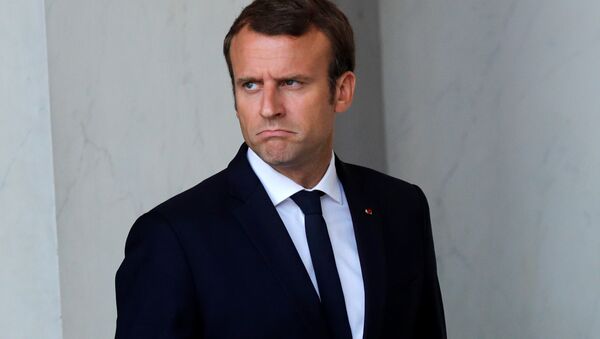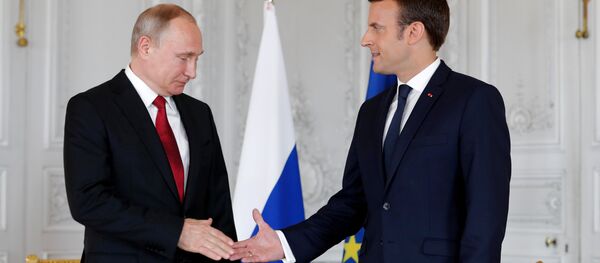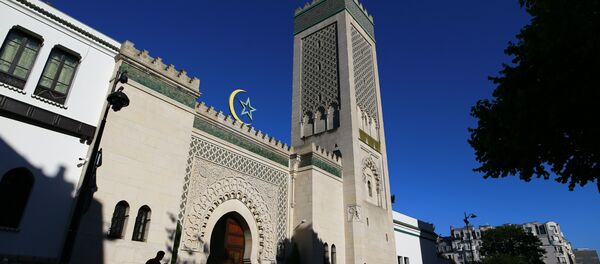The United States has been discussing with its allies, particularly France and the United Kingdom, the possibility of a military strike on Syria in response to the alleged chemical weapons attack on the Syrian town of Duma, which reportedly took place on Saturday. On Thursday, Macron said Paris would decide on further actions in Syria after checking reports about the Duma incident.
Macron seeking political support
"In this affair, Macron is a little soldier who follows [US President Donald] Trump, but has no importance himself … France can act alone, but it can’t prove anything alone. It can strike alone but at the targets, which were pointed out for it by others … France is not considered as an important actor anymore," Jean-Vincent Brisset, a retired brigadier general of the French Air Force and a senior research fellow at the French Institute for International and Strategic Affairs (IRIS), told Sputnik.
In the event the United States decides to launch a strike on Syria, the French role in this military action as a US ally would be "marginal," Brisset suggested.
"The discourse and the operation, if it comes to it, concern only the French foreign policy and communication is focused on the French, and it has no influence on the rest of the conflict," Brisset pointed out.
Gen. Jean-Claude Allard, a senior research fellow at IRIS, who used to serve as the French representative in the US Central Command, and the head of operations for the NATO Kosovo force, suggested that making a decision on such things as a military strike on another country, one needs to take into consideration a lot of factors and different opinions of the international community.
"I’m not even speaking about Russia, Iran, because [in France] we don’t want to listen to them. But on the other hand, the US is favorable of a serious scenario, but between the two [France and the US] there is London which is hesitating, Germany that doesn’t really have a position. One needs to have political support. Now what Macron is looking for is being politically supported," Allard pointed out.
When then US President Barack Obama was pushing for a military strike in Syria in response to the 2013 chemical weapons attack in Ghouta, he lacked proof to present to the Congress at the hearings on the issue, Allard recalled.
On Thursday, Macron said that Paris had proof the Syrian government had used chlorine against civilians in Saturday’s incident.
Macron would be able to receive the required support in the French parliament, however what the president expects is also obtaining political support from other politicians in the international arena, particularly France’s closest allies, the United Kingdom, and the United States, Allard continued.
It is difficult to predict if Macron would be able to provide France's allies with unquestionable proof, which would lead to a collective decision on military actions against Syria, the expert suggested.
"[UK Prime Minister] Theresa May is acting with caution because she finds herself in a difficult situation as her predecessor [Tony Blair] went to war in the Gulf without a proof and became an object of аn investigation, and was criticized over that," Allard stated.
"Will this strike provoke it – it depends on the type of a strike, what would be targeted, it depends on the Russian reaction, on whether Russian troops would come under fire, which risks to be very, very troubling on the international level. That’s largely due to this, that the strike did not take place yet. One needs to consider all this and determine the targets," Allard explained.
Low interest of French public
"The public opinion in this matter is rather blurred and changing. It depends largely on the way the media are painting this affair. But more than a decade [ago] the public started being rather skeptical about the decisions taken," Allard said.
Those people interested in the military actions in Syria are very skeptical about the intervention actually being launched, the expert said.
"As far as support of the French to this intervention is concerned, one has to know that it doesn’t interest them much since there’s a discourse explaining there was a chemical attack without showing anything else," Brisset pointed out.
Brisset recalled then French President Francois Holland praising the 2013 French intervention in Mali, reiterating that actions of Paris are more visible in the communications area, rather than having a serious geopolitical effect on the international level.
The opinions expressed are those of speakers alone and do not necessarily reflect the position of Sputnik News.




